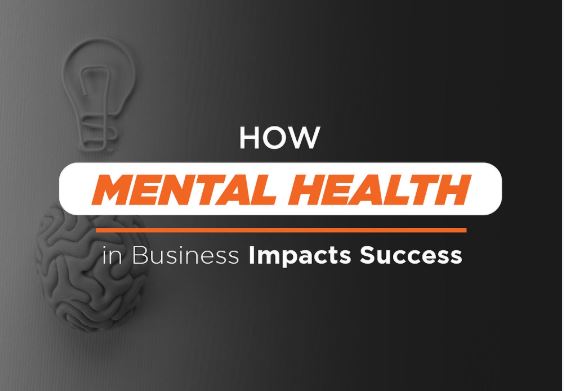Introduction
As an entrepreneur, managing your mental health can often feel like just another task on your to-do list. But the question how do entrepreneurs manage their mental health? is crucial for both personal well-being and business success. Balancing work, stress, and personal life can be challenging, and neglecting mental health can lead to burnout and poor decision-making. In this post, we’ll share practical strategies to help entrepreneurs maintain their mental well-being while staying focused on growing their business. Let’s explore some tips to keep your mind and business thriving.
Understanding the Importance of Mental Health for Entrepreneurs
As an entrepreneur, your mental health is integral to your overall success and well-being. In the high-pressure world of business, where stress is often constant, maintaining a healthy mental state is just as important as having business skills. Your mindset, emotional resilience, and ability to make clear decisions can directly impact the success of your business. A healthy mental state ensures that you stay motivated, creative, and resilient in the face of challenges.

When you’re mentally well, you’re better equipped to manage the stress of day-to-day operations and overcome obstacles with a calm and clear approach. However, when mental health is neglected, it can lead to burnout, decreased productivity, and even poor decision-making. For entrepreneurs, mental health challenges can ripple out, affecting not just their work but their personal relationships as well. Prioritizing mental health is not only important for personal well-being but is also essential for sustained business success.
Why Mental Health is Challenging for Entrepreneurs
The pressures of entrepreneurship are unique, often pushing business owners to their physical and emotional limits. Several factors contribute to the mental health challenges entrepreneurs face, including the weight of responsibility, isolation, financial stress, and the struggle to find work-life balance. Here’s why entrepreneurs are particularly vulnerable to mental health difficulties:
1. The Pressure to Succeed
Entrepreneurs often bear the weight of their business’s success on their shoulders. They invest not just time and money, but also their emotions into the venture. The constant pressure to succeed, grow, and meet financial targets can trigger feelings of anxiety, stress, and self-doubt. Entrepreneurs may fear failure, which can lead to overwork, neglect of personal well-being, and a constant internal dialogue of questioning whether they’re doing enough.
This constant pressure can take a toll on mental health, leaving entrepreneurs feeling overwhelmed and unable to shut off their thoughts, leading to exhaustion. The drive to succeed can blur the lines between personal and professional lives, often resulting in long work hours and an unhealthy work-life balance.
2. The Isolation Factor
Unlike employees who have teams or managers to support them, entrepreneurs often work alone or in small teams. This isolation can cause feelings of loneliness and detachment, which can exacerbate stress and anxiety. The lack of a strong support system to share experiences with can lead to mental exhaustion and burnout. Without the camaraderie of colleagues or the emotional support from friends, entrepreneurs may feel like they are shouldering the burden alone.

This sense of isolation is particularly true in the early stages of starting a business, where entrepreneurs often find themselves handling every aspect of the business. While this level of responsibility is common, it can quickly become overwhelming and mentally draining.
3. Work-Life Balance
Achieving a work-life balance is notoriously challenging for entrepreneurs. The demands of running a business often require long hours, and there’s always more work to be done. This lack of time for personal relaxation, socializing, or self-care leads to a deterioration in mental health. Over time, entrepreneurs may find themselves burned out, with little to no time for self-rejuvenation.
Without a clear boundary between work and life, entrepreneurs may feel like they are always “on,” contributing to heightened stress and fatigue. The inability to detach from work can leave entrepreneurs feeling mentally drained and incapable of maintaining the necessary energy for both personal and professional commitments.
4. Financial Stress
For many entrepreneurs, financial stress is a significant concern. The pressure of maintaining cash flow, securing funding, or managing debt can cause constant worry. The uncertainty of financial situations, coupled with the unpredictability of the market, can overwhelm even the most experienced entrepreneurs.
Entrepreneurs may feel that their personal and professional lives are at risk due to financial instability, which adds a layer of anxiety. When finances are unstable, stress can cloud judgment and decision-making, leading to poor financial choices that may ultimately harm both mental health and the business.
Signs That Your Mental Health Might Be at Risk
Entrepreneurs often push themselves to the limit, but how do you know when it’s time to step back and focus on your mental health? Recognizing the signs of stress, burnout, or emotional fatigue is crucial for addressing these issues before they escalate.
1. Chronic Fatigue
If you’re constantly feeling tired, even after a full night’s sleep, you might be dealing with mental exhaustion. Entrepreneurs frequently work long hours and push their physical and mental limits, which can result in chronic fatigue. This exhaustion can negatively affect your productivity, creativity, and overall well-being, potentially leading to burnout.

It’s important to listen to your body. If you’re feeling drained day after day, even after taking breaks, it may be time to reassess your workload and take steps to recharge.
2. Increased Irritability
When stress piles up, it can manifest as irritability or frustration, even with small things. Entrepreneurs often find themselves getting short-tempered or upset easily when overwhelmed by work. This heightened irritability is a sign of mental fatigue, which can lead to emotional outbursts or poor communication with employees, clients, or business partners.
Irritability is a warning sign that your mental health is being taxed, and it’s essential to address it before it leads to strained relationships or further burnout.
3. Lack of Focus or Motivation
One of the first signs that your mental health may be slipping is a lack of motivation or focus. Entrepreneurs who experience burnout or emotional fatigue may find it difficult to maintain their usual level of enthusiasm for their business. This lack of focus can lead to procrastination, unfinished tasks, and missed opportunities.
If you notice a shift in your ability to stay engaged in your business, it may be time to reassess your workload or implement strategies to rejuvenate your energy and motivation.
4. Physical Symptoms
Mental health struggles don’t only affect thoughts and emotions; they can also manifest physically. Entrepreneurs who experience high levels of stress and anxiety may suffer from physical symptoms such as headaches, stomach issues, muscle tension, or difficulty sleeping. If you’re experiencing any of these physical signs, it may be an indication that stress is taking a significant toll on your well-being.
Paying attention to these symptoms is critical, as they can worsen over time if left unaddressed, affecting both your personal health and your business performance.
Effective Strategies for Managing Mental Health as an Entrepreneur
Given the unique pressures entrepreneurs face, it’s essential to adopt strategies that prioritize mental health while managing the demands of running a business. Here are some effective ways to stay mentally healthy as an entrepreneur:
1. Prioritize Self-Care
Self-care is essential for mental health, yet it’s often overlooked in the hustle and bustle of entrepreneurship. By making self-care a priority, you can better manage stress, maintain energy levels, and stay mentally sharp.
Regular Exercise
Exercise not only keeps your body healthy but also boosts your mood and reduces stress. Regular physical activity can help improve your mental clarity, increase productivity, and elevate your overall sense of well-being. Whether it’s yoga, running, or weight training, aim for at least 30 minutes of exercise each day to clear your mind and boost your energy levels.
Proper Sleep
Sleep is one of the most important components of mental health. Entrepreneurs are often tempted to stay up late to work on their businesses, but consistent sleep deprivation can lead to cognitive decline, mood swings, and poor decision-making. Aim for 7-9 hours of quality sleep per night to recharge both your body and mind.

Healthy Eating
Eating a balanced diet can stabilize your mood and boost your energy. Avoid processed foods and excessive caffeine, which can cause mood swings and crashes. Opt for whole, nutrient-rich foods like vegetables, lean proteins, and healthy fats to fuel your body and mind.
Mindfulness and Meditation
Mindfulness practices such as meditation, deep breathing, or guided relaxation exercises can help reduce stress and improve focus. Taking just 10 minutes a day to practice mindfulness can have a profound impact on your mental health by promoting relaxation and reducing anxiety.
2. Set Boundaries Between Work and Personal Life
To maintain mental health, it’s important to create clear boundaries between work and personal life. This separation helps ensure that work doesn’t consume all of your time and mental energy.
Create a Set Work Schedule
Establish a specific work schedule and stick to it. When you have designated work hours, it becomes easier to leave work behind when the day ends, allowing you to fully engage in personal activities without distractions.
Take Regular Breaks
Taking breaks throughout the day is essential for maintaining focus and reducing burnout. The Pomodoro Technique—working for 25 minutes and taking a 5-minute break—can improve productivity and give your mind the rest it needs to stay sharp.
Plan Time Off
Take vacations or personal days to recharge. Stepping away from the business helps you reset mentally and emotionally. A refreshed mind is more effective at problem-solving and decision-making.

3. Seek Support
Entrepreneurship doesn’t have to be a lonely journey. Seeking support from others can make a significant difference in maintaining mental health.
Surround Yourself with Positive People
Building a network of positive and supportive people can help reduce the feelings of isolation that entrepreneurs often face. Whether it’s friends, family, or fellow entrepreneurs, surrounding yourself with those who encourage and understand your journey can reduce stress.
Find a Mentor
Having a mentor can provide valuable insight into both business and mental health challenges. Mentors can offer advice, help you navigate difficult situations, and provide emotional support when things get tough.
Join Entrepreneurial Communities
Connect with other entrepreneurs by joining online forums or local business groups. These communities can offer a sense of camaraderie and allow you to share experiences, ask questions, and find emotional support.
Conclusion: Prioritizing Mental Health for Entrepreneurial Success
Entrepreneurship brings both challenges and rewards, making mental health a key factor in long-term success. By focusing on self-care, setting work-life boundaries, and building a support network, entrepreneurs can maintain their mental well-being while growing their businesses. Your mental health is not just important—it’s essential for resilience and sustained performance. Recognizing the signs of stress and taking proactive steps ensures that you can face entrepreneurial challenges with clarity and strength. Investing in your mental health today will set the stage for your success tomorrow.


